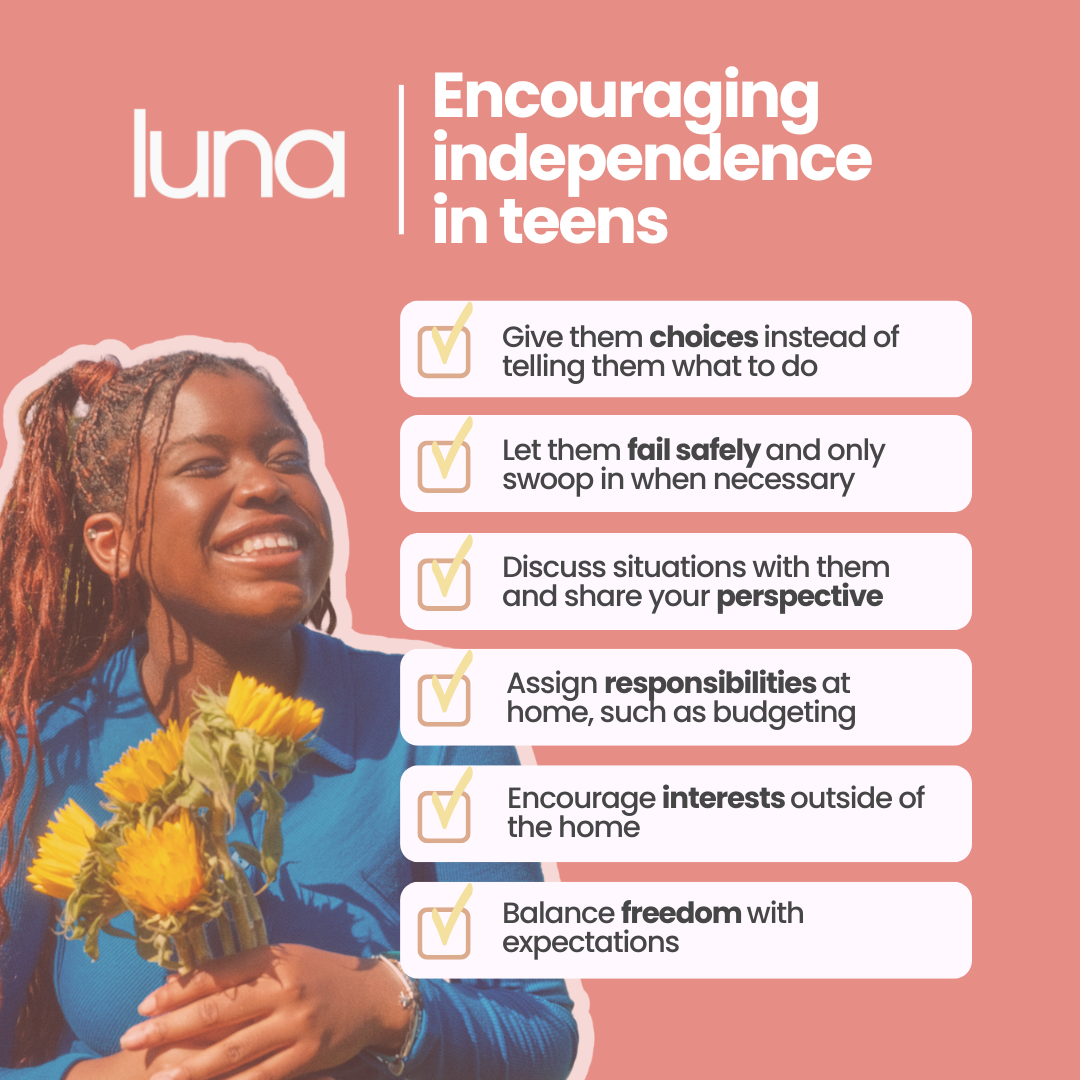Encouraging independence in your teen
Practical tips to stepping back

Updated December 2, 2025 • Medically reviewed by Dr. Emma Dickie
Medically reviewed by Dr. Emma DickieIn this article
Quick summary
- Independence for teens is about responsibility, decision-making, and confidence, not the absence of guidance
- Small shifts in how you support them (rather than how you control them) make a huge impact
- The balance is encouraging their freedom while staying connected and clear on expectations

Teenagers are wired to seek autonomy.
It’s how they figure out who they are, what they value, and how to function in the world.
But independence doesn’t mean cutting them loose.
Instead, it’s all about supporting them as they learn to stand on their own.
Helping your teen become more independent is one of the trickiest balancing acts of parenting.
You want to give them freedom, but not so much that they fall flat on their face (think: FAFO parenting). You want to be supportive, but not hovering (so not like you're spying on them).
Thankfully, independence doesn’t happen overnight, and it doesn’t mean stepping away completely.
It’s all about small steps that help your teen feel capable, trusted, and confident in who they’re becoming.
Let’s look at what independence really means for teens today, and how you can encourage it without losing connection along the way.
What does independence look like for your teen?
When we talk about independence, it might conjure images of moving out or flying the nest, but for teens, it’s much more subtle and everyday.
It’s things like:
- Choosing what to cook for dinner and doing it
- Managing school deadlines and exam revision without you prompting every step
- Deciding how to spend their free time and following through
- Handling money for a part-time job or managing their own allowance
- Making safe choices when you’re not right next to them
- Owning their mistakes and learning from them
- Asking for help when they need it
- Getting themselves up and out for school
Some teens will sprint toward independence. Others will take baby steps. Both are normal.
Why encouraging independence matters
As your teen grows, so does their world and the skills they need to navigate it.
Encouraging them to explore outside interests, make their own decisions, and gradually take on more responsibility helps them develop a sense of confidence and capability.
Letting them try, fail, learn, and succeed (sometimes all in the same day!) builds resilience and trust, not just in you, but in themselves.
This is sometimes called FAFO parenting, a way of letting teens learn from experience while knowing you’re still in their corner.
Over time, those small moments of independence are what shape a confident, capable young adult.
Top tips to encourage independence in teens

It’s totally normal to want to step in and help (especially when you can see the mess about to happen!).
But giving your teen space to figure things out for themselves is one of the best gifts you can offer.
Here are some gentle ways to help them build independence, without it feeling like you’re pushing them away:
- Give them choices: offer options instead of orders – “would you rather walk the dog before or after dinner?” gives them control without chaos
- Let them fail safely: mistakes are part of learning. If they forget their homework, leave their room messy, or overspend their allowance, resist the urge to swoop in
- Assign real responsibilities at home: chores, budgeting a small allowance, or planning a meal or outing, give them ownership and practical skills
- Talk through decisions: ask how they’d handle a tricky situation, then share your perspective. However, remember that it’s not a test, but a conversation
- Respect their space: knock before entering, avoid snooping, and let them have some privacy. It shows trust and builds mutual respect
- Model independence yourself: show them how you manage your own time, stress, and responsibilities – teens learn by watching
- Balance freedom with clear expectations: set boundaries together (curfews, screen time, check-in plans) and involve them in the discussion so it’s less “my rules” and more “our agreement”
- Encourage interests outside the home: hobbies, sports, part-time work, or volunteering give teens space to grow, learn, and rely on themselves
What independence isn’t
Just as important as knowing what to do is knowing what to avoid.
Independence isn’t:
- Dropping all rules and leaving your teen completely on their own
- Expecting perfection or flawless decision-making
- Removing yourself entirely from their life
True independence grows when you’re still there, but stepping back just enough so your teen can step forward.
Keeping the conversation open
As your teen expands their independence, the way you talk with them matters more than ever.
Simple, genuine conversations build trust and connection, making stepping back less scary for both of you.
Try:
- “What’s something you’d like to try on your own this month?”
- “What would help you feel ready to take on that responsibility?”
- “What went well when you managed that yourself, and what would you do differently next time?”
When your teen knows you trust them and still have their back, they’re far more likely to take on responsibility with confidence.
Nurturing capable young adults
Helping your teen become more independent doesn’t happen overnight.
It’s a journey of small steps, consistent support, and lots of patience.
When you shift from “I must direct everything” to “I trust you to decide and learn,” you set them up for resilience and responsibility, and motivate your teen to explore the world on their own.
If you’d like extra support for your teen and a safe space where they can ask questions, learn skills, and ask questions to trusted experts, the luna app is there to help.
With luna, they can get extra support when growing up and navigating their own independence and wellbeing.

How we created this article:
luna's team of experts comprises GPs, Dermatologists, Safeguarding Leads and Junior Doctors as well as Medical Students with specialised interests in paediatric care, mental health and gynaecology. All articles are created by experts, and reviewed by a member of luna's senior review team.
Sources:
NHS "Encouraging independence" | Accessed 14.11.25
https://cambspborochildrenshealth.nhs.uk/child-development-and-growing-up/encouraging-independence-in-young-people/We'd love to keep in touch!
Sign up to our parent newsletter for emails on the latest teen trends, insights into our luna community and to keep up to date
By signing up, you are agreeing that we can use your email address to market to you. You can unsubscribe from marketing emails at any time by using the link in our emails. For more information, please review our privacy statement.